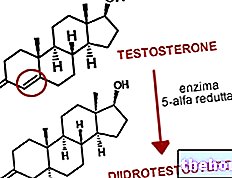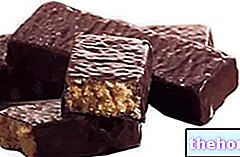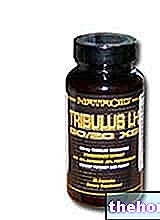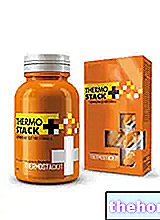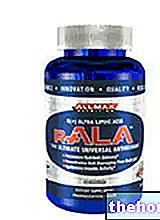The product commonly sold in herbalists under the name psyllium is made from the seeds or cuticle of Plantago psyllium (= Plantago arenaria, Plantago indica), an annual herbaceous plant grown mainly in Iran, India, Pakistan and the United States of America.
Benefits for health
Mucilages are polysaccharides with a complex chemical composition, belonging to the category of soluble fibers and with an emollient, protective, anti-inflammatory, laxative - constipating effect.
The main characteristic of psyllium seeds is linked precisely to the mucilaginous coating that covers them, which in contact with water expands to increase its weight by 25 times. The best known effect of psyllium, the laxative, therefore depends on its ability to recall liquids in the lumen of the intestine, swelling, increasing the intestinal contents and consequently stimulating peristalsis and evacuation. This effect, called "bulk forming", is typical of laxatives that increase and soften the fecal mass (called "mechanical "), particularly appreciated for their safety and efficacy. Like all laxatives belonging to this category, to obtain the desired effect, even psyllium seeds must be taken together with abundant liquids and used in the right quantities.

The ability of psyllium to draw liquids into the intestinal lumen and swell, is useful not only in case of constipation, but also in the presence of diarrhea. In the latter case it acts by absorbing excess fluids and increasing the consistency of the fecal bolus (also called kilo).
Due to its normalizing effect on intestinal transit and on the consistency of feces, psyllium has also proved useful in colitis and in cases of irritable colon and diverticulosis; its lubricating effect, linked to the ability to increase the softness of the stool, makes it useful even in the presence of hemorrhoids and anal fissures.
For all these reasons, psyllium is a common ingredient in some breakfast cereals, but also an important component of food supplements and widely used drugs, as normalizers of intestinal functions or as laxatives.
Doses of intake
It is currently believed that a daily consumption of 5-7 grams of psyllium seeds is useful for normalizing intestinal functions and to prevent cardiovascular disorders (by accelerating intestinal transit, they reduce the absorption of cholesterol, harmful substances and slow down that of simple sugars. ; it follows a normalizing effect on glycemic values and on LDL cholesterol). The intake of psyllium must be accompanied by an adequate quantity of water (150-200 ml every 5 grams).
At the same weight, the effects are much higher for the mucilaginous extracts of psyllium than for whole seeds, since the mucilages are concentrated in the cuticle ("external integument"). In these cases, an intake of 2 grams / day is sufficient.
Watch the video
- Watch the video on youtube
Side effects
If used for a long time and in higher than recommended doses, psyllium can cause flatulence and a feeling of bloating. Mass laxatives should not be used in the presence of esophageal or gastrointestinal strictures, that is, in those cases in which constipation is due to a mechanical obstruction (cancer, inflammation and chronic ischemia, endometriosis, hernias, neoplasms of the ovary or uterus ). Caution in the presence of toxic megacolon, due to its ability to alter the motility of the colon. It is also advisable to avoid taking psyllium shortly before bedtime, to prevent it from obstructing the esophagus. subjected to hypocholesterolemic and hypoglycemic therapy (psyllium seeds enhance the effect of these drugs).
Select plant Fir Acacia Acerola Sorrel Yarrow Yarrow Yarrow Aconito Adatoda Garlic Agnocasto Agrimonia Alchemilla Alkekengi Aloe Altea Witch Hazel Ammi or Visnaga Pineapple Andrographis Anemone Pulsatilla Angelica Anise Star Anise Japanese Star Anise Bitter Orange Bitter Areca Arnica Harpagophytum Arpagophyte Artemisia Asteragus Basil Asparagus Asparagus Peruvian Asparagus Asparagus Asparagus Hawthorn Boldo Borage Shepherd's Purse Boswellia Bucco Butea superba Cocoa Coffee Cajeput Calamus Calamus Marigold Camedrio Chamomile Roman Chamomile Camphor Cinnamon Ceylon Maidenhair Capuchin Artichoke Cardamom Cardiac Thistle Asian Thistle Carvi Cascara Cassia Catecu Catha Cabbage Celandine Chicory Centaurea Cinnamon Cypress Celandine Chives Cypress Coca Cola Colchico Combreto Condurango Comfrey Coriander Cranberry Barberry American Chrysanthemum Cumin Turmeric Damiana Digital Dioscorea Drosera Dulcamara Dunalilella Echinacea Eder a Ephedra Elenio Eleutherococcus Helichrysum Evening primrose Horsetail Alfalfa Erica Euphrasia Erisimo Escolzia Eucalyptus Farfara Farfaraccio Calabar bean Fenugreek Fennel Phytolacca Frangola Ash Fumaria Japanese Mushrooms Galega Ganoderma lucidum Garcinia Cambogia Mulberry Gentian Broom Ginkgo Ginkgo Guipana Guipana Gynestra Ginkgo Hibelia Gymnasium Hibiscus Guarulp St. John's Wort Horse Chestnut Ispaghul Hyssop Jaborandi Kava kava Konjac Laminaria Cherry Laurel Lavender Lemongrass Lespedeza Lovage Icelandic Lichen Lemon Flax Lippia Licorice Lobelia Hops Maca Marjoram Maize Mallow Manna Marrubio Marrubio d "water Matè Melaleuca Meliloto American Lemon balm Myrtle Myrama Walnut Nutmeg Walnut vomica Olive tree Meadowsweet Ononide Opuntia Oregano Orthosiphon Nettle Poppy Papaya Parietaria Feverfew Passiflora Chilli Perilla Periwinkle Phyllanthus Plantain Picrorhiza Pilosella Pino Pisci dia Podofillo Polygala Grapefruit Parsley Psyllium Pueraria mirifica Butcher's broom Pygeum Quassia Oak Rhubarb Ratania Rauwolfia currant Castor bean Rhodiola Rosehip Rosemary Rue Willow Sarsaparilla Sage Elderberry Sassafras Sedum Ergot Senna Serenoa Repens Soybean Solidago Tansy Taraxus Tamarind Tamarind Tamarind Tamarind Tamarindo Ursina Valerian Vanilla Mullein Verbena Veronica Viburnum Vinca Pansy Mistletoe Vine Withania Yohimbe Saffron Ginger Pumpkin Select disease Juvenile Acne Rosacea Tinnitus Tinnitus Aerophagia Tendon Affections Afonia Aphthae Algias Functional Halitosis Breastfeeding Allergy Anemia Anguish Anxiety Arteriosclerosis Asthrosis Asthrosis Arthritis Arthritis Men Sex Woman Blepharitis and Conjunctivitis Eye bags Bronchitis Gallstones Kidney stones Salivary stones Baldness Androgenetic Candida Fragile hair Caries Headache Cellulitis Motion sickness Cystitis C limaterio Cholecystopathy High cholesterol Ulcerative colitis Colonoscopy Contusions Hematoma Convalescence Couperose Depression Dermatitis Diaper dermatitis Diabetes Diarrhea Erectile dysfunction Dyslipidemia Dysmenorrhea Dyspepsia Disturbances of vision Hemorrhoids Epistaxis Herethism Heart disease Fever Fibromyalgia Gastro-intestinal disease Flatulence Hypertension Fibromyalgia Gastrointomnia Jaundice Laryngitis Renal lithiasis Toothache Sore throat Thinness Menopause Meteorism Mononucleosis Alzheimer's disease Crohn's disease Nausea Vomiting Obesity Dark circles Onychomycosis Osteoporosis Dry skin Periarthritis Piorea Low pressure Prostatitis Psoriasis Colds Breast fissures Anal fissures Gastro-nasal rhinitis Senescence Premenstrual Syndrome Sinusitis Quit smoking Overweight Fatty liver Constipation Stomatitis Stress Cough Triglycerides high Ulcer Burns Nails Brittle flashes Heat Warts Dizziness Properties herbal Tanning Abortive adaptogenic Aphrodisiac bittering analgesic anesthetic anorectics analgesic antacid anti-allergic anti-asthmatic Antibiotic catarrh Anticellulitiche anticonvulsant Antidiaforetiche antidiarrheal edematous anthelmintic antiemetic Antiemorroidarie antiphlogistic Antiidrotiche Antinevrotiche Antioxidants antipyretic antirheumatic antiscorbutic Antiseptic antispasmodic anti-uric Aperitive Flavoring Astringent Balsamic Bechiche Capillarotrope Cardiotonic Carminative Cathartic Caustics Healing Cholagogues Choleretic Dyes Decongestants Deodorants Purifying Diaphoretic Cleansers Disinfectants Detoxifiers Thirst quenching Diuretics Exciting Emetics Emmenagogues Emollients Hemostatic Energies Hepatoprotectors Expectorants Eupepticus Moisturisers Galactosensitizers lanti Hypertensive Hypnotic Hypoglycemic Hypotensive Irritants Laxatives Soothing Narcotic Nerves Nutrients Odontalgic Pectoral Purgative Revulsive Remineralizing Refreshing Rubefacient Scialagoghe Sedative Soporifugas Sneezing Stomachic Stomatics Narcotic Vascular Tightenitis


